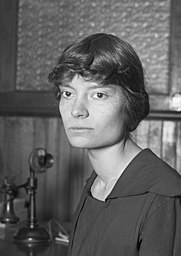 Logo/masthead used on the Catholic Worker Movement website and newspaper Logo/masthead used on the Catholic Worker Movement website and newspaper | |
| Formation | May 1, 1933; 91 years ago (1933-05-01) |
|---|---|
| Founders | |
| Purpose | Catholic anarchist activism |
| Membership | 200 Catholic worker houses of hospitality and farms internationally (2023) |
| Publication | Catholic Worker newspaper |
| Website | catholicworker |
The Catholic Worker Movement is a collection of autonomous communities founded by Dorothy Day and Peter Maurin in the United States in 1933. Its aim is to "live in accordance with the justice and charity of Jesus Christ". One of its guiding principles is hospitality towards those on the margin of society, based on the principles of communitarianism and personalism. To this end, the movement claims over 240 local Catholic Worker communities providing social services. Each house has a different mission, going about the work of social justice in its own way, suited to its local region.
Catholic Worker houses are not official organs of the Catholic Church, and their activities, inspired by Day's example, may be more or less overtly religious in tone and inspiration depending on the particular institution. The movement campaigns for nonviolence and is active in opposing both war and the unequal global distribution of wealth. Day also founded the Catholic Worker newspaper, still published by the two Catholic Worker houses in New York City, and sold for a penny a copy.
History

 The founders of the movement, Dorothy Day and Peter Maurin
The founders of the movement, Dorothy Day and Peter Maurin
The Catholic Worker Movement started with the Catholic Worker newspaper, created by Dorothy Day to advance Catholic social teaching and be a neutral, Christian pacifist position in the war-torn 1930s. Day attempted to put her words from the Catholic Worker into action through "houses of hospitality" and then through a series of farms for people to live together on communes. The idea of voluntary poverty was advocated for those who volunteered to work at the houses of hospitality. Many people would come to the Catholic Workers for assistance, then becoming Workers themselves. Initially, these houses of hospitality had little organization and no requirements for membership. As time passed some basic rules and policies were established. Day appointed the directors of each of the houses, each of which operated autonomously and came to vary in size and character. In the 1930s, the St. Louis Workers served 3,400 people a day while the Detroit Workers served around 600 a day.
The Catholic Worker newspaper spread the idea to other cities in the United States, as well as to Canada and the United Kingdom, through the reports printed by those who had experienced working in the houses of hospitality. More than 30 independent but affiliated communities had been founded by 1941. Between 1965 and 1980 an additional 76 communities were founded with 35 of these still in existence today, such as the "Hippie Kitchen" founded in the back of a van by two Catholic Workers on Skid Row, Los Angeles in the 1970s. Well over 200 communities exist today, including several in Australia, the United Kingdom, Canada, Germany, the Netherlands, Mexico, New Zealand, and Sweden.
Day, who died in 1980, is under consideration for sainthood by the Catholic Church.
Beliefs
"Our rule is the works of mercy," said Dorothy Day. "It is the way of sacrifice, worship, a sense of reverence."
According to co-founder Peter Maurin, the following are the beliefs of the Catholic Worker:
- gentle personalism of traditional Catholicism.
- personal obligation of looking after the needs of our brother.
- daily practice of the Works of Mercy.
- houses of hospitality for the immediate relief of those who are in need.
- establishment of Farming Communes where each one works according to his ability and receives according to his need.
- creating a new society within the shell of the old with the philosophy of the new.
The radical philosophy of the group can be described as Christian anarchism. Anne Klejment, a history lecturer at the University of St. Thomas, wrote of the movement:
The Catholic Worker considered itself a Christian anarchist movement. All authority came from God; and the state, having by choice distanced itself from Christian perfectionism, forfeited its ultimate authority over the citizen… Catholic Worker anarchism followed Christ as a model of nonviolent revolutionary behavior… He respected individual conscience. But he also preached a prophetic message, difficult for many of his contemporaries to embrace.
| Part of a series on | ||||||
| Libertarian socialism | ||||||
|---|---|---|---|---|---|---|
 | ||||||
| Political concepts | ||||||
| Economics | ||||||
| People | ||||||
Philosophies and tendencies
|
||||||
| History | ||||||
| Related topics | ||||||
Family involvement
Families have had a variety of roles in the Catholic Worker Movement. Because those donating funds to the houses of hospitality were primarily interested in helping the poor, the higher cost of maintaining a volunteer family (as opposed to maintaining an individual volunteer) conflicted with the wishes of those donating. Author Daniel McKanan has suggested that, for a variety of reasons, Dorothy Day's perspective on family involvement in the movement was controversial. Despite these elements of conflict, families have participated in the Catholic Worker Movement through multiple avenues: some assist the houses of hospitality while others open up a "Christ room" in their homes for people in need. There are many other opportunities for family involvement in the Catholic Worker as well, with some families running their own houses of hospitality.
See also
- Catholic Radical Alliance
- Catholic social teaching
- Catholic trade unions
- Christian anarchism
- Christian communism
- Christian left
- Christian socialism
- Christian trade unions
- Christian views on poverty and wealth
- Catholicism and socialism
- Friendship House
- Georgism
- Industrial Workers of the World
- Liberation theology
- List of anti-war organizations
- Political Catholicism
- Settlement movement
- Saint Patrick's Day Four
- Pitstop Ploughshares
Similar Christian movements
- Anabaptism, in particular the emerging peace church movement
- Beguines and Beghards, medieval religious communities composed entirely of laity
- Christian democracy, particularly distributism
- Focolare, Catholic/Ecumenical movement promoting the ideals of unity and universal brotherhood.
- Madonna House Apostolate
- "New Monasticism" related communities
- Peace Churches
- Servants to Asia's Urban Poor
- Labour Church
Notes
- The concept of "a new society within the shell of the old" appeared in the preamble to the constitution of the IWW, though it was not given a religious rationale. Archived September 4, 2011, at the Wayback Machine
References
- Darline Roden, Renée (May 15, 2023). "The Anarchism of the Catholic Worker". The Nation. Retrieved December 1, 2023.
- "The Aims and Means of the Catholic Worker". Catholicworker.org. Archived from the original on December 5, 2019. Retrieved February 4, 2018.
- "Catholic Worker Movement". Catholicworker.org. Archived from the original on January 31, 2016. Retrieved February 7, 2005.
- Piehl 1982, p. 96.
- Piehl 1982, p. 98.
- ^ Piehl 1982, p. 107.
- Piehl 1982, pp. 98–99.
- Piehl 1982, p. 106.
- Piehl 1982, p. 110.
- Dan McKanan, Catholic Worker After Dorothy, Liturgical Press, 2008. pp 75–76 via books.google.com
- Streeter, Kurt (April 9, 2014). "A couple's commitment to skid row doesn't waver". Los Angeles Times. Archived from the original on February 4, 2018. Retrieved February 4, 2018.
- "Directory of Catholic Worker Communities". www.catholicworker.org. Archived from the original on January 7, 2017. Retrieved January 8, 2017.
- Gibson, David (November 14, 2012). "Saint Dorothy Day? Controversial, Yes, But Bishops Push for Canonization". The Huffington Post. Archived from the original on April 10, 2016. Retrieved February 4, 2018.
- "US bishops endorse sainthood cause of Catholic Worker's Dorothy Day". Catholic News Service. Archived from the original on December 7, 2012. Retrieved November 8, 2022.
- Maurin, Peter. "What the Catholic Worker Believes". www.catholicworker.org. Archived from the original on November 15, 2018. Retrieved November 9, 2017.
- Cornell, Tom (May 2010). "In Defense of Anarchism". Catholic Worker. LXXVII (77th Anniversary Issue): 4–5.
- Prentiss, Craig R. (2008). Debating God's Economy: Social Justice in America on the Eve of Vatican II. Penn State Press. p. 74. ISBN 978-0-27104762-1.
Subsidiarity and its value in promoting the philosophy of personalism was also key to undergirding perhaps the most distinctive element of the CW ideology, its Christian anarchism
- Klejment, Anne; Coy, Patrick (1988). A Revolution of the heart: essays on the Catholic worker. Temple University Press. pp. 293–94. ISBN 978-0-87722-531-7 – via books.google.co.uk.
- ^ McKanan 2007a.
- McKanan 2007a, p. 94.
- McKanan 2007b, p. 154.
- McKanan 2007b, p. 158.
Sources
- McKanan, Daniel (March 2007a). "Inventing the Catholic Worker Family". Church History. 76 (1): 94. doi:10.1017/s0009640700101428. JSTOR 27644925. S2CID 162589205.
- McKanan, Daniel (April 2007b). "The Family, the Gospel, and the Catholic Worker". The Journal of Religion. 87 (2): 153–182. doi:10.1086/510646. JSTOR 10.1086/510646. S2CID 145471121.
- Piehl, Mel (1982). Breaking Bread: The Catholic Worker and the Origin of Catholic Radicalism in America. Philadelphia: Temple University Press. ISBN 9780877222576.
Further reading
- Dorothy Day (1997) Loaves and Fishes: The inspiring story of the Catholic Worker Movement. Maryknoll: Orbis Books, 1963.
- On the English CW, see: Olivier Rota, From a social question with religious echoes to a religious question with social echoes. The 'Jewish Question' and the English Catholic Worker (1939–1948) in Houston Catholic Worker, Vol. XXV n°3, May–June 2005, pp. 4–5.
External links
- Main website of the Catholic Worker Movement
- Dorothy Day-Catholic Worker Collection at Marquette University
- The Way of Love: Dorothy Day and the American Right – by Bill Kauffman, Whole Earth (Summer 2000)
- Following Jesus in love and anarchy – The Times, February 29, 2008
- Maurin, Day, the Catholic Worker, and Anarcho-Distributism by Nicholas Evans 2018
| Catholic laity | |||||||
|---|---|---|---|---|---|---|---|
| Organizations of lay members of the Catholic Church who are neither in holy orders nor members of religious institutes | |||||||
| Personal ordinariates, prelatures, and apostolic administrations |  | ||||||
| Third orders |
| ||||||
| Confraternities |
| ||||||
| International associations of the faithful |
| ||||||
| Other associations of the faithful |
| ||||||
| Movements |
| ||||||
| See also |
| ||||||
| Associations of the Christian faithful | ||
|---|---|---|
| International associations of the faithful |
|  |
| Other associations of the faithful |
| |
| Catholic Church | |||||||||||||
|---|---|---|---|---|---|---|---|---|---|---|---|---|---|
| History Timeline Ecclesiastical Legal |
| ||||||||||||
| Theology Bible Tradition Catechism |
| ||||||||||||
| Philosophy | |||||||||||||
| Saints | |||||||||||||
| Organisation Hierarchy Canon law Laity Precedence By country |
| ||||||||||||
| Culture | |||||||||||||
| Media | |||||||||||||
| Religious orders, institutes, societies |
| ||||||||||||
| Associations of the faithful | |||||||||||||
| Charities | |||||||||||||
- Catholic Worker Movement
- Anti–Iraq War groups
- Catholic lay organisations
- Catholic social teaching
- Catholic trade unions
- Catholicism and far-left politics
- Christian anarchism
- Christian pacifism
- Christian radicalism
- Christian organizations established in 1933
- Dorothy Day
- Distributism
- Anarchist intentional communities
- Christian communities
